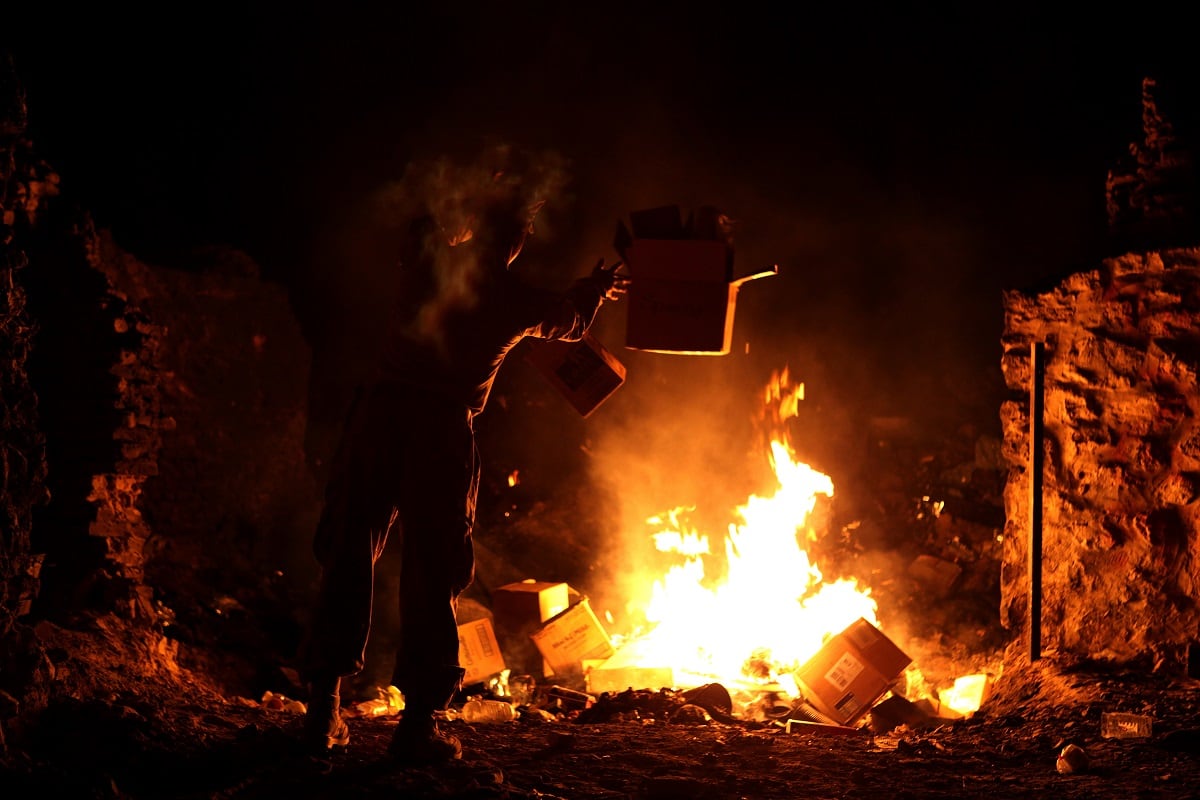Lawmakers introduced a bill Thursday that would recognize the health hazards posed by oil well fires, burn pits and other pollution sources in Afghanistan and much of the Middle East — an effort they say would help ill veterans who apply for VA benefits.
The “Veterans Burn Pit Exposure Recognition” bill, S. 2950, would declare that service members who deployed to the Middle East in the 1990-1991 Persian Gulf War and after, to Afghanistan and Djibouti following Sept. 11, 2001, and to Iraq beginning in 2003 were exposed to toxins.
The bill stops short of establishing service connection for specific diseases and does not guarantee disability benefits for ill veterans.
But it would require the Department of Veterans Affairs to concede that veterans were exposed to pollutants if they served in the named locations during the specified time frames, effectively eliminating a need for them to prove that they were in close proximity to a pollution source.
Sponsors Sens. Dan Sullivan, R-Alaska, and Joe Manchin, D-W.Va., say the legislation is needed because currently, VA requires veterans to show evidence of their exposure to support benefits claims and frequently rejects claims on the lack of evidence on exposure.
But since “the locations of burn pits … and possible health effects associated by their use, may never be completely known,” the proposed legislation states it would eliminate the requirement that they prove proximity.
The burden of proof regarding known exposure currently faces Navy and Marine Corps Vietnam veterans who served on Navy ships and were recently granted presumptive status for exposure to Agent Orange.
These “blue water” veterans who have a disease linked to the use of defoliants during the war must prove the ships they served on sailed within 12 miles of the shore.
“West Virginians have seen first-hand how long it’s taken for the Vietnam-era veterans who were exposed to toxic chemicals like Agent Orange to receive the care and benefits they deserve, and the toll it took on them and their families. I want to make sure that doesn’t happen to this generation of veterans,” Manchin said.
“The [bill] reaffirms our commitment to those in uniform and ensures we will not wait decades to tackle this issue head on,” Sullivan said.
In February 1991, Iraqi troops set Kuwaiti oil wells on fire, producing clouds of smoke that turned the skies to twilight and blanketed U.S. troops with fine, oily dust that covered skin, clothing, belongings, weapons, work and living spaces.
In Afghanistan and Djibouti after Sept. 11, 2001, and Iraq beginning in 2003, the U.S. military used burn pits to dispose of the refuse generated by military operations, including food waste and household trash, but also plastics, batteries, computer parts, animal carcasses, hospital waste, furniture and more.
RELATED

Troops reported that soot from the pits often coated work and housing areas with a fine green-black powder and many developed chronic coughs, sinusitus and other respiratory symptoms they referred to as the “Iraqi crud.”
At their peak, more than 270 burn pits were in use in Afghanistan, Iraq and Djibouti. As of March, nine remained active, including seven in Syria, one in Afghanistan and one in Egypt.
Veterans, veterans service organizations and some physicians attribute rare cancers, some respiratory diseases and other health conditions seen in Gulf War and post 9/11 troops to exposure to these conditions.
In addition to conceding that certain hazardous duty stations pose a potential health hazard, the bill also acknowledges an information gap regarding the location, use and hazards posed by burn pits and encourages ongoing research by DoD and VA.
Veterans who would be covered under the bill include: those who served in Kuwait, Saudi Arabia, Bahrain, Oman, Qatar and United Arab Emirates beginning on Aug. 2, 1990; those who served in Iraq from Aug. 23, 1990, to Feb. 28, 1991, and beginning on March 19, 2003; veterans of Afghanistan and Djibouti, beginning on Sept. 11, 2001; and any other locations set forth in the VA Airborne Hazards and Open Burn Pit Registry or as deemed by the VA secretary.
The bill names fine particulate matter, 16 types of hydrocarbons, 15 volatile organic compounds and 17 dioxin compounds as known toxins.
Several veterans service organizations, including Disabled American Veterans and Paralyzed Veterans of America, pushed for the legislation.
“This bipartisan bill will help get rid of red tape and assist affected veterans seeking burn pit-related benefits,” said Randy Reese, executive director of the Washington headquarters of Disabled American Veterans.
“For years, we’ve known of the adverse health effects caused by burn pits, and in that time we’ve seen too many seriously ill veterans struggle to get help from the VA because they lacked the documentation to prove what everyone already knows — that they were exposed to toxic chemicals released by burn pits while serving overseas."
Retired Navy Yeoman First Class Lauren Price, whose organization Veterans Warriors has supported legislation that would require VA to declare presumptive conditions related to Iraq and Afghanistan service, praised the bill as one that would significantly help veterans, and unlike the legislation the group has supported, may not encounter the same “pushback from budget conscious” lawmakers.
“It’s truly a concession bill, saying ‘We concede that there were nasty chemicals all over the place.’ All you have to do is prove you were there and if you have a disease. It would mean the VA adjudicators simply couldn’t reject your claim because you couldn’t prove you live a football field away from a burn pit,” said Price, an Iraq veteran. “It’s a good bill.”
Patricia Kime is a senior writer covering military and veterans health care, medicine and personnel issues.




